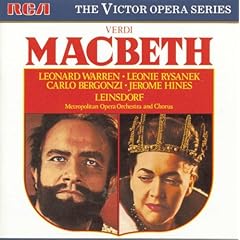Vamos con la primera entrega de nuestro repaso discográfico:
Warren, Rysanek, Hines, Bergonzi - RCA, 1959 – Leinsdorf
<center>
 Macbeth - Giuseppe Verdi
Macbeth - Giuseppe Verdi
Erich Leinsdorf (1959)
Macbeth - Leonard Warren
Banco - Jerome Hines
Lady Macbeth - Leonie Rysanek
Dama de Lady Macbeth - Carlotta Ordassy
Macduff - Carlo Bergonzi
Malcolm - William Olvis
Médico - Gerhard Pechner
Criado de Macbeth - Harold Sternberg
Sicario - Osie Hawkins
Apparizione I - Calvin Marsh
Apparizione II - Emilia Cundari
Apparizione III - Mildred Allen
Orquesta: Metropolitan Opera
Coro: Metropolitan Opera
Grabado en estudio
RCA</center>
Estamos ante el primer registro en estudio de nuestra ópera del mes. Con un reparto calcado al que representó el título verdiano en el Met semanas antes, la RCA, con Leinsdorf al frente, registró por vez primera el título que nos ocupa. El resultado es sobresaliente. Sobre todo debe valorarse el testimonio del Macbeth de Warren en estudio. Su rey, de acentos casi taciturnos, y no exento de contrastes veristas, es la muestra más redonda de un Macbeth reflexivo y cariacontecido, menos visceral. A mi juicio es lo más sobresaliente de la toma, junto a Bergonzi, que deslumbra por el timbre claro de aquellos años y por unos acentos verdianos ausentes en Rysanek y Hines. Rysanek está enorme, pero no es precisamente la voz que requiere el rol, como veremos en el hilo correspondiente, y opta además por dar un perfil crudelísimo a su Lady Macbeth, ahorrándose los más que necesarios contrastes con un canto bello y seductor, genuinamente belcantista en momentos clave. Hines se limita a cumplir, con esa voz a veces demasiado oscura y cavernosa para el canto verdiano. La labor de Leinsdorf, por cierto, se me antoja bastante anodina, por no decir demasiado sosa.
Si no estoy mal informado, el Met (Rudolf Bing, en concreto) habia pensado en Callas y Warren para las representaciones que preceden a esta toma. Pero no queda ahí la maravilla: se pensó en Mitropoulos para dirigir ese Macbeth.

Hubiera sido alucinante, una versión electrizante como pocas, sin esos "lunares" menores que hay en la de Leinsdorf. El proyecto se truncó por la salud cardiaca de Mitropoulos, con una recaída quince días antes de la primera representación, y por la negativa de Callas a cantar Lady Macbeth sólo unos pocos días tras una Traviata (según le habría requerido Bing).

Más datos sobre lo dicho en torno a Mitropoulos y Callas en esta crónica de la primera representación con Rysanek y Warren:
Citar:
Review in Variety signed by "Land."
Verdi's "Macbeth," 112 years old, is a new and wonderfully welcome addition to the repertory at the Metropolitan Opera House. It arrives widely misidentified as an American "premiere." although the work was done 18-odd years ago by the old New Opera Co. and was mounted by Julius Rudel at the N. Y. City Center (Margaret Webster staging) in 1957. Not to overlook the concert version given by Thomas Scherman's Little Orchestra Society.
This is an exciting show as well as a full-blooded, highly melodic opera full of pyschological characterization derived from Shakespeare's stage play. Its "first" at the Met proved last Thursday (5) one of the more exciting occasions of recent seasons. Partly, this was due to the chain-reaction explosions of audience enthusiasm for the debuting soprano, Leonie Rysanek, from Vienna. She proved a powerful and shaded Lady Macbeth, though occasionally a trifle "wholesome" in appearance and beauty of voice for such a dagger-happy Highland lassie.
There may be talk as to whether Maria Callas would have been a more edgy, gore-obsessed Lady Macbeth had she not quarrelled with the Met management and lost the chance. Misguided fans of Callas shouted her name aloud (she's in Italy at the moment) in regret that this was not be her night.
It was very definitely Mme. Rysanek's. Seldom does any soprano, especially on a debut register so dramatically. No matter that the Met held the lights, the curtain and the music to allow the third act ovation to exhaust its full force. The point is that the soprano had built up a magnificent head of audience steam. She may well cherish this performance forevermore as "a, or the, peak of her career."
'Macbeth" is a many-scened opera which is "loaded" with fine singing, solo and group. There were respectable, earned smaller ovations for Jerome Hines (Banquo) and Carlo Bergonzi (Macduff) though these roles are quite minor in the libretto of F. M. Piave. The authority in the pit of Erich Leinsdorf (substituting for the hospitalized Dimitri Mitropoulos) was masterly, and the audience's mood of rhapsody rewarded him mountingly during the evening so that Leinsdorf was nip-and-tuck with Leonard Warren of the title role as second man on the prestige totem pole.
Within the over-all gratitude for such a vital and electrifying new item as "Macbeth" why quibble about the witches, or some of the details of Carl Ebert's staging? the opera affords exquisite singing and remarkable (for an opera) melodrama. The sets of Caspar Neher (with an assist) by Robert Paddock) cannily mingle dark tones, gaunt terrain, and peevish pinks. In investiture, as in music, this Scotland of "Lucia di Lammermoor" look and sound like East Lynne in hamfat.
"Macbeth" is the eighth work by Verdi in the Met rep, and a stunning success. As a guess it ought to become the demand ticket that Mozart's "Don Giovanni" was last season.



